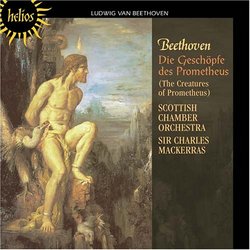| All Artists: Ludwig van Beethoven, Charles Mackerras, Scottish Chamber Orchestra Title: Beethoven: Die Geschöpfe des Prometheus Members Wishing: 1 Total Copies: 0 Label: Hyperion UK Release Date: 5/10/2005 Album Type: Import Genre: Classical Styles: Ballets & Dances, Ballets, Historical Periods, Classical (c.1770-1830), Modern, 20th, & 21st Century, Symphonies Number of Discs: 1 SwapaCD Credits: 1 Other Editions: Complete Beethoven Edition, Vol. 3: Orchestral Works UPC: 034571151960 |
Search - Ludwig van Beethoven, Charles Mackerras, Scottish Chamber Orchestra :: Beethoven: Die Geschöpfe des Prometheus
 | Ludwig van Beethoven, Charles Mackerras, Scottish Chamber Orchestra Beethoven: Die Geschöpfe des Prometheus Genre: Classical |
Larger Image |
CD Details |
CD ReviewsPacked with good - but not great - performances cdsullivan@massed.net | Cambridge, MA USA | 02/22/2002 (4 out of 5 stars) "This, the third volume of Deutsche Grammophon's Complete Beethoven Edition, features all the orchestral works and stage music he wrote outside of symphony and opera. Much of the music featured in this set is not great Beethoven; there are very early, developmental or unambitious works (for example, all the minuets and contredanses, which date from the 1790s, when he was in his twenties), and there are many pieces which are just not the beneficiary of Beethoven's best writing (he seems to be on automatic pilot for some of the incidental music, including "The Ruins of Athens" and "King Stephen"). Still, there are many gems in this set - more than enough to justify buying it. The "Ritterballet," a very early work, is absolutely delightful, and is given a delightful performance by - surprise, surprise - the ubiquitous Karajan. The incidental music to "Egmont," of which only the Overture is well known, is real, inspired Beethoven, and is given a fine performance by Abbado and Studer. Even the contredanses and minuets have their good moments. One of them in particular (Contredanse No. 7) cries out for you to listen to it, because that's the one Beethoven used as the basis of not only parts of the ballet "Die Geschöpfe des Prometheus," and the "Eroica" Variations for piano, but also the finale of the "Eroica" Symphony! All of the contredanses and minuets are given sensitively and charmingly by Marriner and the ASMF.There is more great music in this set - for example, the overtures ("Coriolan" and "Egmont" especially, but also "Die Ruinen von Athens," "Zur Namensfeier," "König Stephan," "Die Weihe des Hauses"), some of which are just as magnificent as his symphonies. I'm thinking in particular of "Coriolan," Op. 62, which is one of the most intense, tragic, furious pieces he ever wrote (it's in his "rage" key, C minor). Unfortunately, many of these overtures are entrusted to Claudio Abbado, and I can't say he does a very good job with them. "Coriolan" in particular suffers from a lack of intensity, which is unbelievable considering the intensity of the work. The congested recording (early digital) does not help. (If you want to hear a tremendous recording of the "Coriolan," look to Volume 20 of the CBE and Furtwängler!) The other works are well-performed, including Karajan's distinguished account of Beethoven's potboiler "Wellingtons Sieg."Overall, it is disappointing to find that the best performances have been given to the automatic pilot works, while the towering masterpieces which cry out for great performances have been given mediocre performances. However, given the superlative quality of the booklet (multiple essays by distinguished musicologists, color paintings reproduced, artist biographies, etc.), the worthy quality of most of the performances and, perhaps most importantly, the scarcity of other performances of this music, there are many reasons why this is worth buying."
|
